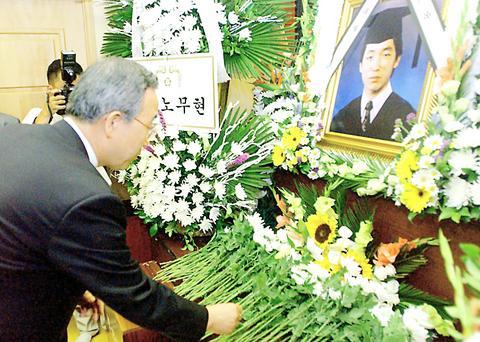South Koreans reacted with shock and anger yesterday to the beheading of a hostage in Iraq by militants who killed him after Seoul refused their demand to withdraw its troops and scrap plans to send more.
US soldiers found the decapitated body of Kim Sun-il on Tuesday, five days after he was seized in Fallujah, west of Baghdad, by a group led by militant Abu Musab al-Zarqawi.

PHOTO: AP
The group killed 33-year-old Kim, who had been shown in a video pleading for his life, after Seoul stood firm on keeping 670 South Korean medics and engineers in Iraq and on plans to send 3,000 troops to join US-led forces there.
A sombre President Roh Moo-hyun condemned the killing but said South Korea would send troops rather than bow to terrorism.
"I still feel heartbroken to remember that the deceased was desperately pleading for his life," Roh said, referring to the video showing a terrified Kim crying: "I don't want to die."
Kim's parents had urged their government to do everything to save their son, an Arabic speaker and evangelical Christian, who worked in Iraq for a year as a translator for a South Korean firm supplying goods to the US army.
After news of his death, they sat cross-legged and stunned in their modest backstreet house in the South Korean city of Pusan, as relatives and neighbors sought to console his sister, who was wailing and thrashing around in grief.
Roh has argued the troop decision was a tough but crucial step to support its US ally and that the forces were intended to help rebuild the country.
Since early April, dozens of foreign hostages have been seized in Iraq.

AIR SUPPORT: The Ministry of National Defense thanked the US for the delivery, adding that it was an indicator of the White House’s commitment to the Taiwan Relations Act Deputy Minister of National Defense Po Horng-huei (柏鴻輝) and Representative to the US Alexander Yui on Friday attended a delivery ceremony for the first of Taiwan’s long-awaited 66 F-16C/D Block 70 jets at a Lockheed Martin Corp factory in Greenville, South Carolina. “We are so proud to be the global home of the F-16 and to support Taiwan’s air defense capabilities,” US Representative William Timmons wrote on X, alongside a photograph of Taiwanese and US officials at the event. The F-16C/D Block 70 jets Taiwan ordered have the same capabilities as aircraft that had been upgraded to F-16Vs. The batch of Lockheed Martin

GRIDLOCK: The National Fire Agency’s Special Search and Rescue team is on standby to travel to the countries to help out with the rescue effort A powerful earthquake rocked Myanmar and neighboring Thailand yesterday, killing at least three people in Bangkok and burying dozens when a high-rise building under construction collapsed. Footage shared on social media from Myanmar’s second-largest city showed widespread destruction, raising fears that many were trapped under the rubble or killed. The magnitude 7.7 earthquake, with an epicenter near Mandalay in Myanmar, struck at midday and was followed by a strong magnitude 6.4 aftershock. The extent of death, injury and destruction — especially in Myanmar, which is embroiled in a civil war and where information is tightly controlled at the best of times —

China's military today said it began joint army, navy and rocket force exercises around Taiwan to "serve as a stern warning and powerful deterrent against Taiwanese independence," calling President William Lai (賴清德) a "parasite." The exercises come after Lai called Beijing a "foreign hostile force" last month. More than 10 Chinese military ships approached close to Taiwan's 24 nautical mile (44.4km) contiguous zone this morning and Taiwan sent its own warships to respond, two senior Taiwanese officials said. Taiwan has not yet detected any live fire by the Chinese military so far, one of the officials said. The drills took place after US Secretary

THUGGISH BEHAVIOR: Encouraging people to report independence supporters is another intimidation tactic that threatens cross-strait peace, the state department said China setting up an online system for reporting “Taiwanese independence” advocates is an “irresponsible and reprehensible” act, a US government spokesperson said on Friday. “China’s call for private individuals to report on alleged ‘persecution or suppression’ by supposed ‘Taiwan independence henchmen and accomplices’ is irresponsible and reprehensible,” an unnamed US Department of State spokesperson told the Central News Agency in an e-mail. The move is part of Beijing’s “intimidation campaign” against Taiwan and its supporters, and is “threatening free speech around the world, destabilizing the Indo-Pacific region, and deliberately eroding the cross-strait status quo,” the spokesperson said. The Chinese Communist Party’s “threats